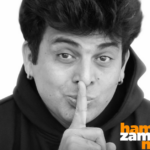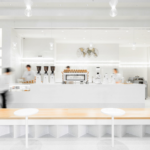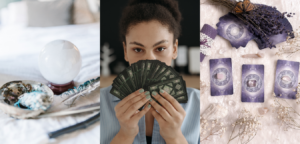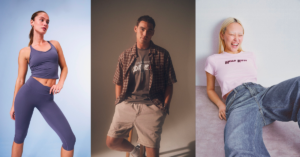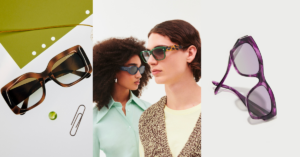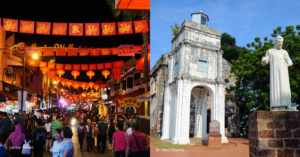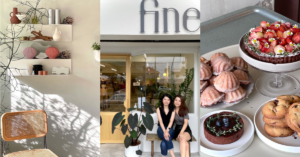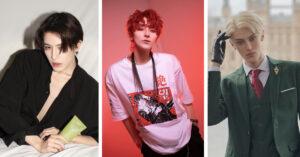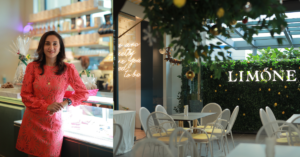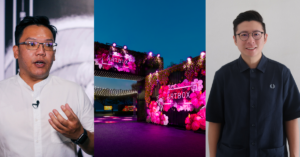Step into the world of laughter, where humour takes centre stage and sharp wit reigns supreme. In our first ever digital cover for Glitz Malaysia, we have the pleasure of getting up close and personal with Joanne Kam, a Malaysian comedy legend who has been tickling funny bones for an impressive three decades. You might have heard that meeting your favourite comedian can be a risky endeavour – what if they turn out to be nothing like the persona they portray on stage? Well, Joanne Kam is here to shatter that stereotype. She’s everything you imagined she would be and more.

Our interview with Joanne took place at the elegant aLoft Hotel Kuala Lumpur Sentral, setting the stage for a delightful rendezvous. The hotel is a haven of comfort and style, boasting accommodating staff who make every guest feel like a VIP. With a great infinity pool and bar, it’s the perfect backdrop for an engaging conversation with a comedy queen like Joanne Kam.
Joanne is renowned not just for her comedic prowess but also for being as open and approachable as she is on stage. In a world where celebrities often hide behind personas, Joanne’s authenticity shines through. So, buckle up for an unforgettable journey into the mind of a woman who can make you laugh till your sides ache, even during a casual chat. Get ready for the hilarity, the insights, and the unexpected twists in this exclusive interview with the one and only Joanne Kam.
Interview with Joanne Kam
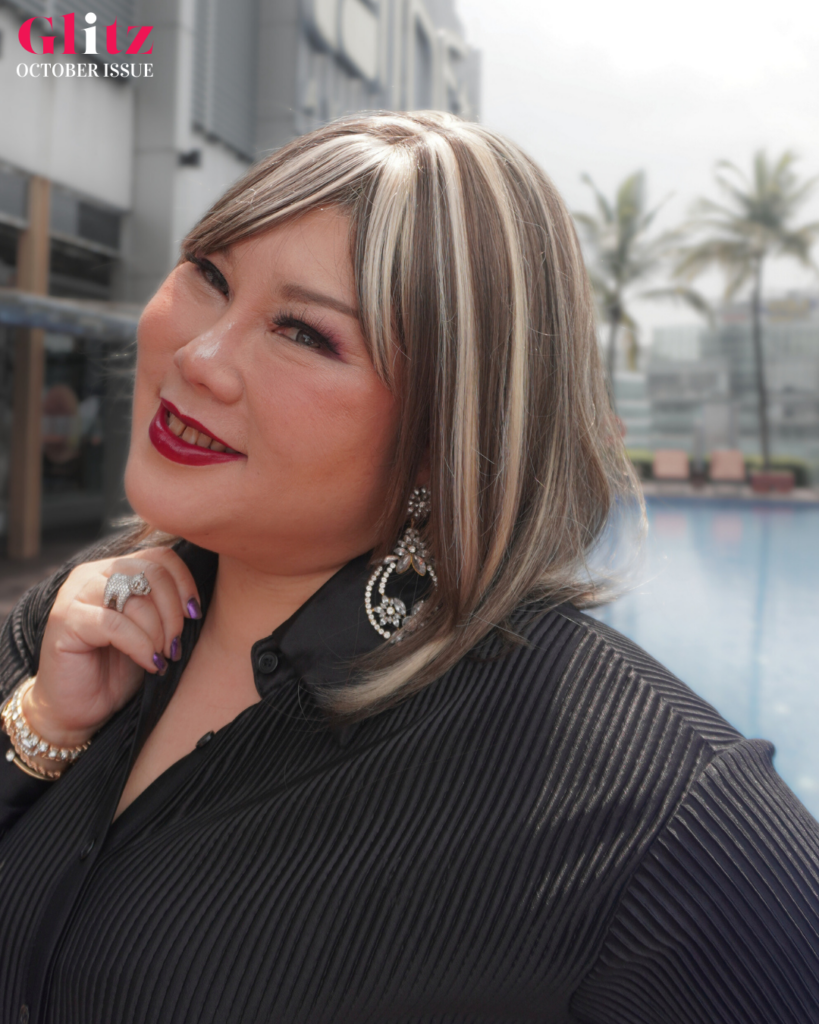
You’ve roasted societal norms with such finesse that even a perfectly cooked satay would be jealous. How do you manage to skewer outdated traditions while keeping your comedy fresh?
“What are outdated traditions of comedy? I think comedy is essentially timeless. But if we want to talk about old style versus new style, roasting is kind of new. Roasting is not old. Roasting happened because the MTV culture happened and everybody just wanted to be roasted. So I feel that there is a way to keep up with whatever’s happening around, but I think comedy essentially is very timeless. As long as you’re sincere with your comedy you will get your audience anyway.”
Your humour often exposes the quirks of modern life. If you were to write a survival guide for the digital age, what would be the first chapter?
“Learn how to deal without Wi -Fi. Learn how to get to places without Waze and learn how to connect with people one-on-one and not through an app. Before you could even send a WhatsApp, how did you communicate with your friends? You literally had to call them on their phone, like an actual [landline] phone and get them out. I’ll call it ‘Back to the Stone Age.’“
Comedy has a way of confronting uncomfortable truths. What’s the most hilariously uncomfortable truth you’ve tackled that left the audience in stitches while squirming in their seats?
“I think the most uncomfortable truth would be me talking about my past. And this is not a joke. But yeah, having to deal with a lot of past traumas and still giving the audience an opportunity to look into my private life, but also bring it back to how I see life as a comedian. Because even though we have to deal with a lot of dark issues in our life, we still need to bring the audience back into the light to ensure that it is a comedy show. And when they leave, they need to leave with the feeling of laughing and being, how would I say, having fun in the show.”
“Being able to laugh at the tragedies of your own life as well. Because I mean, a lot of times we as comedians, how we get into our writing mode is we talk about ourselves. Then a lot of comedians talk about self deprecation. That’s our first thing that we learn in comedy school, you know, because as comedians, we talk about, like, why, we are this way. And that also translates to being able to kind of communicate with your audience to have, how would I say, to tell them that, hey, you know, I’m not on the pedestal, I’m just like you because I share the same issues as all of you. Kind of like, I have that little relatable experience. I mean, if you take, for example, a joke about dating, everyone has been on bad dates before, you know, if you talk about even silly mistakes that you make. As you go on, everyone has that. No one is perfect, that’s what I’m saying. And I think with comedians, we play that up a little bit.”
“It’s all in writing it and also performing it. I think you will need to… like, for a person like me who’s been on stage for 30 over years, there will be moments where, you see my show, like, Kam My Way, there will be moments that will bring you to the dark part of my life. But also, I will be able to take you out from that arena. So in that aspect, I think it’s also a skill. Okay, the comedian has the skill to be able to do that. So through experience and learning. A lot of it will be scripted as well, right? So… But there are moments where you can make that switch. So I think the source material is very important. And of course, your experience with relaying those source material is also very important. So there’s a fine line between- you need the audience to go and experience this part of your life that you really want to be serious about, but you still have to bring them out, break them into pieces, into the comedy side of your life.”
Laughter is universal, yet humour can be subjective. How do you tailor your comedy to resonate with a diverse audience while still staying true to your unique comedic voice?
“I think as comedians, we all have very different voices. And they may be people who like my comedy and people who don’t like my comedy. I think like every comedian can say that, you know, their comedy is, even though it’s for the masses, it’s not for everyone. So it’s very simple. It’s like a movie genre. Okay, let’s say if you like romantic comedies, you like romantic comedies and you don’t like horror. There are some people who like horror. So you cannot please everyone. And if you start. in comedy or even in anything you do, like even if it’s a play or even if it’s a novel, that’s your choice. You need to be true to yourself. You need to tell the story as sincerely as you can. And there will be people who like it. There will be people who will say; this is not for me. You win some, you lose some, but along the way, the people who really matter will stay with you.”
You’ve shattered glass ceilings and expectations with your comedy. If you had to create a “Joanne Kam Signature Cocktail,” what ingredients would it include to capture your comedic essence?
“We’ve actually been toying with the fact of actually creating our own cocktails as well now that the ice cream has been done. I would like to see some form of kumquat or orange because it’s KAM as well. At one point, I was thinking about doing a kumquat, what you call this, kind of like orange blossom kumquat martini or cosmopolitan, kind of like a sexy drink. It needs to be a lady’s drink. It needs to be a sexy lady’s drink. It’s definitely sweet because I’m sweet!”
Actually, we’ve been toying with the idea of it just being “Kam Kuat”, because it’s double. Maybe having cinnamon or pandan and orange doesn’t really go. But I don’t know, there has to be a little spice that works with kumquat oranges. And I think if it’s orange maybe with a little bit of star anise star anise to give it a little bit of cake or even a little bit of like spiciness to it. So it’s either spicy or sweet? I think spicy-sweet is kind of nice!”
Can you share a story or joke that you think perfectly encapsulates Malaysian humour and why it resonates with people in your country?
“I think my Nasi Lemak joke has been like viral to the point where I don’t want it to go viral and I believe that’s the one that people resonate with the most! Even though I hate it going viral again every year, my social media manager says, “We post the nasi lemak” I say again? This is like 5th year already. “Yeah, but people love it”! You know, so I think this was done like oh my god five, six years ago? And I think that’s very Malaysian because I talked about dating a Singaporean and I talked about him bringing me to go eat Singapore Nasi Lemak whereas I am from Malaysia. And then I explained why a Malaysian Nasi Lemak beats Singapore Nasi Lemak. Like every time I put that video up you know, it goes viral and then people fight among themselves. Everyone wants to be right so it’s kind of fun sometimes to see people fight like this about your joke.”
The only time that they [Singaporeans and Malaysians] didn’t fight was when that New York-based, ex-Singaporean comedian thing happened. Yeah, at that time all the Singaporeans had our backs. All of them were like, “Oh, we disown you! Malaysia we love you!” and I think what was nice during that period was that a lot of Singaporeans were already coming to Malaysia to perform. We [Malaysian comedians] were going to Singapore to perform. In fact that month I went to Singapore to perform, invited by Sharul, who’s a Singaporean comedian. So we did kind of address that situation but not naming names and all that. So in that aspect I do feel that Singapore and Malaysia are like brothers, you know? Yeah, we’re like siblings always fighting. In the end, we still need to go to Singapore to earn the Singapore dollar that they pay. I have Singaporean friends who, when they go to JB, they will literally have a massage in the morning. Then they go, eat, eat, eat, eat, eat. And they have massages at night.”
Comedy often thrives on pushing boundaries and challenging societal norms. Have you ever had a moment where you felt your comedy went too far, and how did you navigate the aftermath of that situation?
“I think most recently. Because nowadays we do get some Caucasians into comedy shows and I think this is within the community that we are at this moment like Asian proud. So it’s not to say that the white guys are Karens or whatever but right now at this moment in Malaysia we’re very Asian proud you know so if you’re Ang Mo and if you try to be funny oh you’re gonna get it okay like you’re gonna get it. Not get it in a bad way, but yeah. So I recently put up a video which went viral and I remember and because like it’s on Facebook and all that so of course there was one white girl who like screen captured it and sent it to me and she’s like, “I don’t think this is funny”. Then I look, oh white girl yes uh you’re not important. if I were to respond to everything that I get on social media it can get quite creepy at times yeah.”
“That only happened when I did the Nasi Lemak joke six years ago, and then the Singaporeans messaged me. Because there were some threats and then what was nice they were also Singaporeans…because I remember that specifically and it was a social media team under a different producer and I told him I said, “dude, like this is getting so much hate” and he refused to pull it. He’s like, “no this is good for you!” and I still remember there were a bunch of American Asian comedians and then one of them said, “are you grumbling about being viral right now?” I say, “people are threatening me!” and he’s like unless there’s a gun pointing to your head, why are you? That was when they were all like no let it run, let it run. Because there were people who were really upset. Because the comments just went crazy and to a point that all the Singapore online magazines like Mothership and all published a story about it… yeah and the clip is money! But it’s just okay, because it was in Malaysia right, so when I told it of course the Malaysian audience was like [laughing] so that was the only time that I got death threats.”
Stand-up comedy is known for its vulnerability. Can you tell us about a particularly vulnerable or personal moment you’ve shared on stage, and how it connected with your audience?
“I think for this you need to come and see the actual show so if I’m gonna redo this as a stripped-down show in November. Kam My Way is also a very introspective show in a sense that it’s not just about jokes it’s basically about my life so I will be dealing about my past and also certain things about my mom. But I feel that I’ve gone beyond just doing comedy with just writing jokes at this moment. So this one is something special, which I don’t even know whether after I do this show, whether I can cut bits of it to do in comedy club. Because the whole story it can’t be broken down into smaller parts. As a whole, it connects and it makes sense. And this, in particular, this anniversary show, deals with a lot of personal journey of these 30 years, how I started in Singapore, what happened to me during that time as well as up to now. “
Comedy has evolved significantly over the years with the rise of social media and online platforms. How has the digital age influenced your approach to comedy, and do you think it has changed the way comedians connect with their audience?
“Yes, it definitely has. Because I realised there’s a whole pool of audience that perhaps cannot see me in my live show. Perhaps there are parents who have no mates or no babysitter, older folks. I’m surprised that in Singapore the ones that recognise me the most are the aunties selling the MRT card and the uncles and it’s a few times that I got that! I went to buy the MRT card and then they looked at my IC then, “oh you Kam Poh Poh ah? Eh you do the Nasi Lemak one ah? Oh you very funny, very funny! Auntie knows you!” then they all take pictures and I’m like ok!”
“So, there is a pool of audience there and I think us as comedians are always trying to manoeuvre and see where it hits. Because let’s not forget also, we are dealing with influencers who actually make funny content. They too want to do comedy, stand-up comedy. But because they’ve started with being content creators, we on the other hand are like opposite you know? We are comedians first, but now we want to be content creators! Whereas they are content creators and want to do comedy! But the live stage is very different from the online, I mean the Instagram reels. How many takes, we can do it again and all that. And you don’t need the audience to respond to you, you just need the thing to be cute.”

Many comedians draw inspiration from everyday life and observations. Is there a recent experience or observation that sparked an idea for a new comedic bit, and can you give us a sneak peek of what that might be about?
“Oh so many so many, so many. Okay I did a joke about Chinese influences and it was at the time where I also interviewed Ms Pui Yi. She’s so down to earth all right and her boobs are not that big! But okay, it was kind of cute because I wrote a whole scenario about pretending to meet her in the club and she’s selling me this, I mean giving me a present that is for to rejuvenate your “down there” it’s a whole joke yeah. So it was also during the time where clubs were starting to open up again during MCO like a year ago.”
Shoot Location at Aloft Kuala Lumpur Sentral
Makeup by Agnes Aui
Write Up by Farah Khan
Photography by Farah Khan and Cherelle Lim
In Collaboration with Ethel Da Costa


